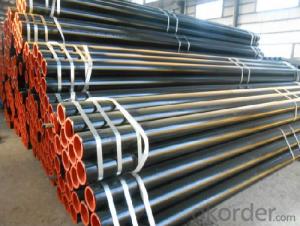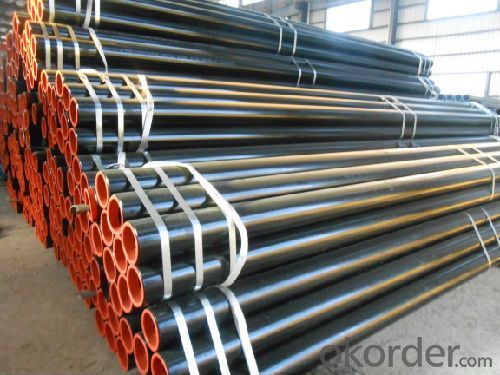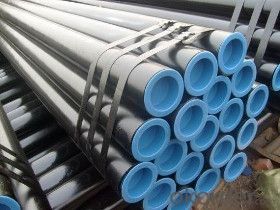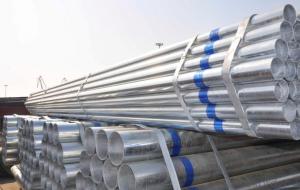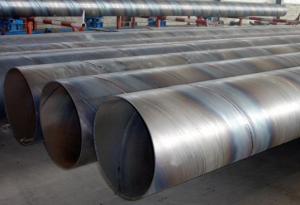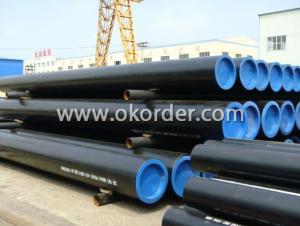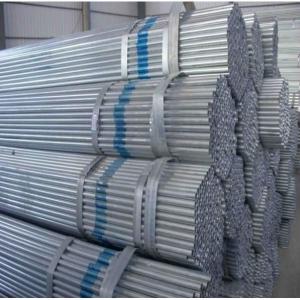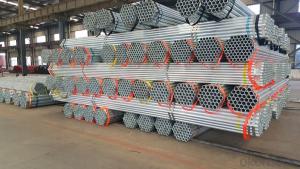Electric Resistance ARC Welded (ERW) Steel Pipe
- Loading Port:
- China Main Port
- Payment Terms:
- TT or LC
- Min Order Qty:
- 30 m.t.
- Supply Capability:
- 12000 m.t./month
OKorder Service Pledge
OKorder Financial Service
You Might Also Like
1、Structure of Seamless Pipe API 5L,API 5CT, ASTM A53, ASTM A500, GB9711.1, GB9711.2:
Seamless pipe is formed by drawing a solid billet over a piercing rod to create the hollow shell. As the manufacturing process does not include any welding, seamless pipes are perceived to be stronger and more reliable. Historically seamless pipe was regarded as withstanding pressure better than other types, and was often more easily available than welded pipe.
Standard: API 5L,API 5CT, ASTM A53, ASTM A500, GB9711.1, GB9711.2
● Application:To be used for conveying gas, water, and petroleum for oil and natural gas industries. And use
for the structural steel pipes purpose
● Main Steel Tube Grade: A, B, X42, X46, X52, X56, X60, X65, X70, J55, K55, N80-1, N80Q, M65, L80-1, C90-1,
C90-2, C95, T95-1, T95-2, P110, 9711, 9712
2、Main Features of the Seamless PipeAPI 5L,API 5CT, ASTM A53, ASTM A500, GB9711.1, GB9711.2
:
• High manufacturing accuracy
• High strength
• Small inertia resistance
• Strong heat dissipation ability
• Good visual effect
• Reasonable price
3、Seamless PipeAPI 5L,API 5CT, ASTM A53, ASTM A500, GB9711.1, GB9711.2
Specification:
Standard | GB, DIN, ASTM ASTM A106-2006, ASTM A53-2007 |
Grade | 10#-45#, 16Mn 10#, 20#, 45#, 16Mn |
Thickness | 8 - 33 mm |
Section Shape | Round |
Outer Diameter | 133 - 219 mm |
Place of Origin | Shandong, China (Mainland) |
Secondary Or Not | Non-secondary |
Application | Hydraulic Pipe |
Technique | Cold Drawn |
Certification | API |
Surface Treatment | factory state or painted black |
Special Pipe | API Pipe |
Alloy Or Not | Non-alloy |
Length | 5-12M |
Outer Diameter | 21.3-610mm |
Grade | 20#, 45#, Q345, API J55, API K55, API L80, API N80, API P110, A53B |
Standard | ASME, ASTM |
4、Packaging & Delivery
Packaging Details: | seaworthy package,bundles wrapped with strong steel strip |
Delivery Detail: | 15-30days after received 30%TT |
5、FAQ of Seamless PipeAPI 5L,API 5CT, ASTM A53, ASTM A500, GB9711.1, GB9711.2:
①How is the quality of your products?
Our products are manufactured strictly according to national and internaional standard, and we take a test
on every pipe before delivered out. If you want see our quality certifications and all kinds of testing report, please just ask us for it.
Guaranteed: If products’ quality don’t accord to discription as we give or the promise before you place order, we promise 100% refund.
②How about price?
Yes, we are factory and be able to give you lowest price below market one, and we have a policy that “ for saving time and absolutely honest business attitude, we quote as lowest as possible for any customer, and discount can be given according to quantity”,if you like bargain and factory price is not low enough as you think, just don’t waste your time.Please trust the quotation we would give you, it is professional one.
③Why should you chose us?
Chose happens because of quality, then price, We can give you both.Additionally, we can also offer professional products inquiry, products knowledge train(for agents), smooth goods delivery, exellent customer solution proposals.Our service formula: good quality+good price+good service=customer’s trust
SGS test is available, customer inspection before shipping is welcome, third party inspection is no problem.
6、Seamless PipeAPI 5L,API 5CT, ASTM A53, ASTM A500, GB9711.1, GB9711.2 Images:
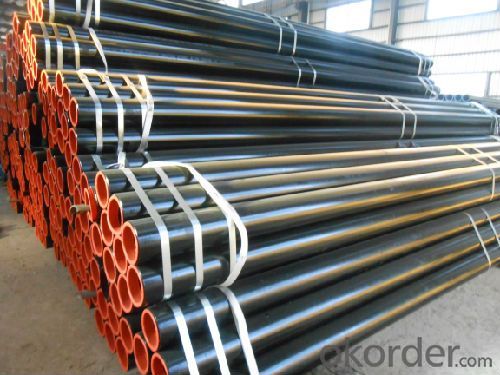
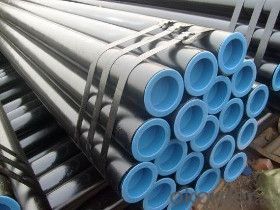
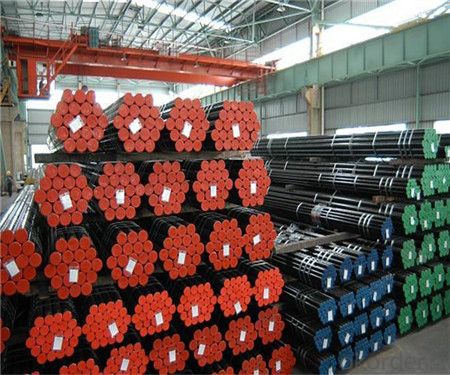
- Q: What are the different methods of pipe cutting for steel pipes?
- There are several methods of cutting steel pipes including manual methods such as hacksaw cutting and abrasive cutting, as well as more advanced methods like plasma cutting, laser cutting, and water jet cutting. Each method has its own advantages and is selected based on the specific requirements of the project.
- Q: Can steel pipes be used for chemical refineries?
- Yes, steel pipes can be used for chemical refineries. Steel pipes are commonly used in chemical industries due to their high strength, durability, and resistance to corrosion. They can withstand high pressure and temperature conditions, making them suitable for transporting various chemicals and fluids within a refinery. Additionally, steel pipes can be easily welded, ensuring a secure and leak-proof system in chemical refineries.
- Q: Can steel pipes be used for conveying solids?
- Yes, steel pipes can be used for conveying solids. Steel pipes are commonly used in various industries to transport solid materials such as ores, minerals, grains, and other bulk materials. They are durable, resistant to high pressure and temperature, and have a smooth interior surface that allows for efficient flow of solids.
- Q: What is the role of steel pipes in the transportation of liquefied natural gas (LNG)?
- Due to their unique properties and characteristics, steel pipes are essential in the transportation of liquefied natural gas (LNG). LNG is a form of natural gas that is cooled to a liquid state for easier transportation and storage. Specific infrastructure is required for the transportation of LNG, and steel pipes are a crucial part of this infrastructure. To begin with, steel pipes are used in the construction of LNG terminals and liquefaction plants. These facilities are responsible for converting natural gas into its liquid form and storing it prior to transportation. The extremely cold temperatures needed to maintain LNG in its liquid state necessitate the use of materials that can withstand these conditions, and steel pipes are well-suited for this purpose. Steel pipes possess excellent strength and durability, enabling them to handle the low temperatures and high pressures involved in the liquefaction and storage processes. Additionally, steel pipes are employed in the transportation of LNG from the liquefaction plants to the storage tanks or shipping vessels. LNG is typically transported over long distances, either through pipelines or specialized LNG carriers. Steel pipes are utilized in the construction of underground or above-ground pipelines, providing a reliable and safe means of transporting the LNG. The pipes must be capable of maintaining the low temperatures of the LNG while enduring the pressures and stresses associated with the transportation process. Steel pipes offer the necessary strength, corrosion resistance, and thermal properties to ensure the safe and efficient transportation of LNG. Finally, steel pipes are also utilized in the construction of storage tanks for LNG. These tanks are designed to keep the LNG in its liquid state until it is ready for use or further transportation. The tanks are often constructed using a combination of steel plates and steel pipes. Steel pipes are employed to connect the various components of the tank, such as the inner and outer shells, reinforcing the structural integrity of the tank and guaranteeing its ability to withstand the extreme conditions to which it is exposed. In conclusion, steel pipes are vital in the transportation of liquefied natural gas (LNG) due to their strength, durability, and ability to endure low temperatures and high pressures. From the construction of LNG terminals and liquefaction plants to transportation through pipelines or specialized vessels, steel pipes are a crucial component of the infrastructure required for the safe and efficient transportation and storage of LNG.
- Q: How do steel pipes handle soil movement?
- Steel pipes are able to handle soil movement quite well due to their inherent strength and durability. The rigid nature of steel pipes allows them to withstand ground shifting, settling, and other soil movements without significant deformation or damage. Additionally, steel pipes can be reinforced with additional supports and anchoring systems to further enhance their ability to handle soil movement.
- Q: Can steel pipes be used for conveying potable water?
- Indeed, steel pipes have the capability to convey potable water. Nevertheless, there are certain factors and precautions that necessitate consideration. Steel pipes possess strength and durability, rendering them suitable for the transportation of water across significant distances. They are also resistant to corrosion and capable of enduring high levels of pressure. In order to guarantee the safety and quality of the water being conveyed, it is crucial to employ pipes that have been specifically designed and manufactured for potable water applications. These pipes are often equipped with coatings or linings composed of materials that inhibit the leaching of contaminants into the water, such as epoxy or cement mortar lining. Furthermore, regular maintenance and inspections should be conducted to prevent the accumulation of sediments or rust that could potentially impact the water quality. It is important to acknowledge that steel pipes may prove more costly in comparison to alternative materials such as plastic or copper. Nevertheless, their longevity and reliability render them a cost-effective choice in the long run. Adhering to local regulations and standards concerning the utilization of steel pipes for conveying potable water is also imperative to ensure the well-being and safety of consumers.
- Q: What are the advantages of using steel pipes in the mining industry?
- There are several advantages of using steel pipes in the mining industry. Firstly, steel pipes are extremely durable and can withstand harsh environmental conditions and heavy loads, making them ideal for underground mining operations. Secondly, steel pipes have high tensile strength, which allows for the transportation of large volumes of materials, such as ore or waste, over long distances. Additionally, steel pipes are resistant to corrosion and erosion, ensuring a longer lifespan and reducing maintenance costs. Lastly, steel pipes are relatively easy to install and can be welded together, providing flexibility in designing and constructing mining infrastructure.
- Q: What are the dimensions of steel pipes?
- The dimensions of steel pipes can vary greatly depending on the specific application and industry requirements. However, common dimensions for steel pipes include diameter, wall thickness, and length. Diameter can range from a few millimeters to several meters, while wall thickness can vary from thin-walled pipes to thick-walled pipes. Lengths can be customized based on project needs, but standard lengths are typically 6 meters or 20 feet.
- Q: How do you prevent steel pipes from freezing?
- One way to prevent steel pipes from freezing is to insulate them with pipe insulation or heat tape. Additionally, keeping the area around the pipes well-heated and ensuring proper ventilation can help prevent freezing.
- Q: What are the environmental impacts of steel pipe manufacturing?
- The environmental impacts of steel pipe manufacturing include the extraction and processing of raw materials, such as iron ore and coal, which can lead to deforestation and habitat destruction. Manufacturing processes, such as smelting and rolling, release significant amounts of greenhouse gases and pollutants into the atmosphere, contributing to climate change and air pollution. Additionally, the disposal of waste materials, such as slag and other byproducts, can contaminate soil and water sources. However, advancements in technology and the adoption of sustainable practices can help mitigate these impacts.
Send your message to us
Electric Resistance ARC Welded (ERW) Steel Pipe
- Loading Port:
- China Main Port
- Payment Terms:
- TT or LC
- Min Order Qty:
- 30 m.t.
- Supply Capability:
- 12000 m.t./month
OKorder Service Pledge
OKorder Financial Service
Similar products
Hot products
Hot Searches
Related keywords
